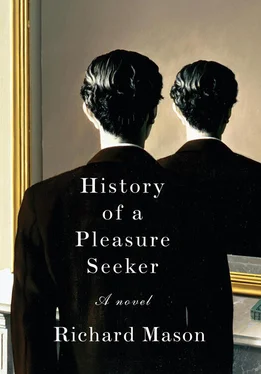Naomi de Leeuw received the telegram announcing her employer’s unexpected return and sent Hilde Wilken to the schoolroom to convey the good news to Egbert. Opening the door in the dining room wall, the maid was confronted by an odd tableau: Piet Barol was balancing precariously on one leg in the middle of the entrance hall while his pupil watched him, shivering. She curtsied. “If you please, Master Egbert, your parents will be home tomorrow.”
Piet had counted on having weeks more to defeat Egbert’s foes. “Thank you, Hilde,” he said sharply, and once she had gone, with a greater sense of urgency, “Call again, old fellow.”
“Black.”
Piet swung his left foot away from his body in a balletic movement and very slowly brought it down on a white tile. “Call again.”
“White.”
Now Piet lifted his right leg and placed it very gently over the intersection of four tiles. He waited. The room was silent. He could hear the boy’s rough breathing and the gurgle of a filling radiator. “Call again,” he said, but Egbert did not speak.
The Vermeulen-Sickerts arrived the next morning, after spending an anxious night in a hotel at Liverpool. Mr. Blok was extremely annoyed to see that Agneta Hemels was not of the party. He assumed she had been let go in New York and regretted the lost opportunity to dismiss her himself. He enjoyed such scenes, which Mrs. de Leeuw’s stable management of the household rarely afforded him.
The news of her protégée’s wickedness shocked the housekeeper to her core. Informed of it by Jacobina, she took the unprecedented step of sitting down in her mistress’ presence, and the first thing she said was: “We must keep this from the lower servants.”
“I quite agree,” said Mr. Blok. “It would set a most unfortunate example.”
And so the fiction that Agneta Hemels had met a man in America, and been proposed to, and departed for Chicago with her employers’ blessing was devised; and when Hilde heard it she went up to the attic and sobbed among the boxes and old trunks and descended in a mood as black as Maarten’s.
Since his unsatisfactory plea for guidance and compassion on the deck of the Lusitania , Maarten Vermeulen-Sickerts had resorted to extreme self-denial. He had consumed nothing but coffee and bread for the remainder of the voyage, which meant that he endured this interview with his butler and housekeeper in a state of detached despair. It was Monday, October 28th, and the newspapers contained apocalyptic news: on both the previous Thursday and Friday, the New York Stock Exchange had barely made it to the closing bell and call money rates were at 150 percent.
Constance saw at once that something very serious was wrong. She kissed her father tenderly, resolving not to pry, but her curiosity did not long go unsatisfied. Before lunch she and Louisa were summoned to the study.
In his bath it had come to Maarten that only total humiliation, consciously self-inflicted, might cleanse the sin of overreaching. It was necessary to tell his family of their changed situation without subterfuge or excuse, and he did not delay. He did not invite Egbert to the conference, though he wished he could include his tutor — because a man of Piet Barol’s merits might have shared the burden of masculine responsibility. But this was impossible. Methodically, in a voice calmed by hunger, he told his wife and daughters what had happened — the snake-tongued Mr. Dermont and his vision of a potentate’s hotel; his own quiescence in the architect’s sinful grandeur; the disappearance of his partner at the crucial hour; his attempts to struggle on; and the Lord’s final, incontrovertible sanction: the loss of half a million dollars and the abrupt expiry of his credit. “I have asked my friends to come after dinner and will throw myself on their mercy,” he said, bleakly. “Without their help, I will go under.”
Listening to him, Louisa longed to shake her father free of his superstitions and was appalled by the totality of his subjection to them. The protective instincts of which Constance was the usual focus surged within her. How she wished she were a man! She would sail to America; track down this Lionel Dermont in Philadelphia; speak to Mr. J. P. Morgan himself, if necessary; demand and secure the restoration of her family’s money. But all she said was, “We’ll manage, Papa. Of course we will,” and hoped that the interview would end before the delivery of her morning’s purchases. It did not. While the family sat in bewildered silence, Hilde Wilken knocked on the door and staggered into the room beneath a bale of oyster cashmere, the card on which read Urgent Delivery — Paid In Full. Louisa had intended to have matching habits made for herself and her sister, but now the idea embarrassed her. “You may take it upstairs, Hilde,” she said. And to her father, once the maid had left them: “I will return it, Papa. It’s the least I can do.”
Maarten was touched by this offer, but it underlined how little experience his daughters had of the real world and how poorly they would navigate it without his money to protect them. “Keep it, my dear,” he replied forlornly. “It will not be the making or the breaking of us.”
Piet had a hint of the crisis that night, leaning out of Didier Loubat’s window, but the young men could not make sense of what they heard.
The girls were engaged in collecting their disposable assets. “I suppose you did always want to open a shop,” said Constance doubtfully, surveying the pile of clothes Louisa had decided they could do without.
“I won’t let you starve, darling. You can be my chief vendeuse.” Once the shock of her father’s news had subsided, Louisa had seen possibilities in her family’s sudden misfortune. “Poor girls go out to work.” She opened her jewel case and removed the ruby bracelet her godmother had left her. “Haven’t you always rather envied them?”
“No.”
“That’s because you lack imagination, my dear.” Louisa sat on the bed. “Think of having a little shop on the Kalverstraat. Very chic, of course, inside. Mirrors and good lighting and soft carpets. All our friends would buy from us.”
“And take pleasure in our downfall.” Constance spoke bitterly. She was thinking of Myrthe Janssen, whose engagement to Frederik van Sigelen had just been announced. Perhaps she had been unwise not to marry when she could. “Do you think anyone will have us now?” she asked, contemplating her reflection in the mirror and deriving some comfort from it.
“What a silly question. Think of the love letters in your desk.”
“They were written to a girl who had a dowry.”
“No, Constance, they were written to you.”
There was silence. Louisa began taking shoes from her closet.
“I wouldn’t marry for money in any case,” said Constance at last, following her own train of thought.
“If you worked with me, you wouldn’t have to.”
“You’re not serious, Louisa.”
“Why ever not?” Until an hour before, Louisa Vermeulen-Sickerts had not been at all serious about opening a shop. She had been content to daydream about what never could be. Now it seemed that her father’s right to oppose her had dwindled dramatically, and her sister’s skepticism provoked a rush of conviction. “If we sold our jewels, we could rent a place and hire Mevrouw Wunder and Babette to work for us. Babette’s an excellent cutter. You could be the model. I’ll design everything and make sure people don’t swindle us.”
“Don’t look so happy about all of this.”
“I’m not.” Louisa adjusted her expression. “But one of us has to be practical.”
“Not tonight, darling.” And Constance went to the window and closed it, because she felt afraid of the future and did not wish her sister to see cowardice in her face.
Читать дальше












